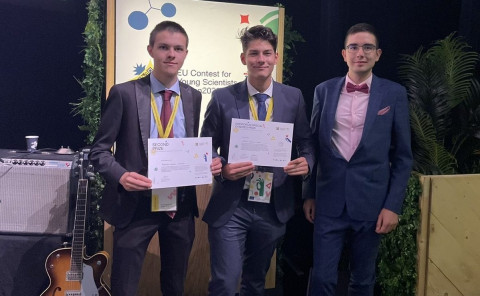
photo: Media Bricks
On September 17, the European Union’s top prizes for young scientists were announced during the EU Contest for Young Scientists (EUCYS) award ceremony in Leiden’s Stadsgehoorzaal, following a five-day competition among 132 promising young scientists aged 14 to 20, coming from 33 countries.
- Aditya Kumar and Aditya Joshi from Ireland for their project A New Method of Solving the Bernoulli Quadrisection Problem
- Andreas Strommer and Michael Lukas Strudler from Austria for their project Vertical axis wind turbine with integrated centrifugal flaps
- Meda Surdokaitė from Lithuania for her project Optimization of the Synthesis of the Fluorescent Dye "Nile Red"
- Konrad Basse Fisker from Denmark for his project Integration of Dsup in Nannochloropsis Oceanica
- The second and third prizes went to project from Czechia, Bulgaria, Slovakia, Canada, Greece, Belgium and Poland.
The students presented 85 different projects to an international jury of 22 highly qualified scientists and engineers with worldwide reputations in their chosen fields. The winners received their awards from the President of the Jury Dr. Mariya Lyubenova, from the European Southern Observatory and from Anna Panagopoulou, Director of the European Research Area and Innovation at the European Commission’s Directorate General for Research and Innovation. The winning projects shared a total of €62 000 in prize money, as well as other prestigious prizes such as visits and short internships to some of the most important and innovative research organisations and companies in Europe.
The participants had all previously won first prizes in their home countries' national science competitions in their specific fields. The projects covered a broad spectrum of scientific areas, including biology, physics, chemistry, computing, social sciences, environment, mathematics, engineering and medicine.
The recovery from the pandemic and the green and digital transitions have further increased the need for science, technology, engineering and maths (STEM) skills in Europe. The contest seeks to promote young people to study STEM and pursue a career in science.